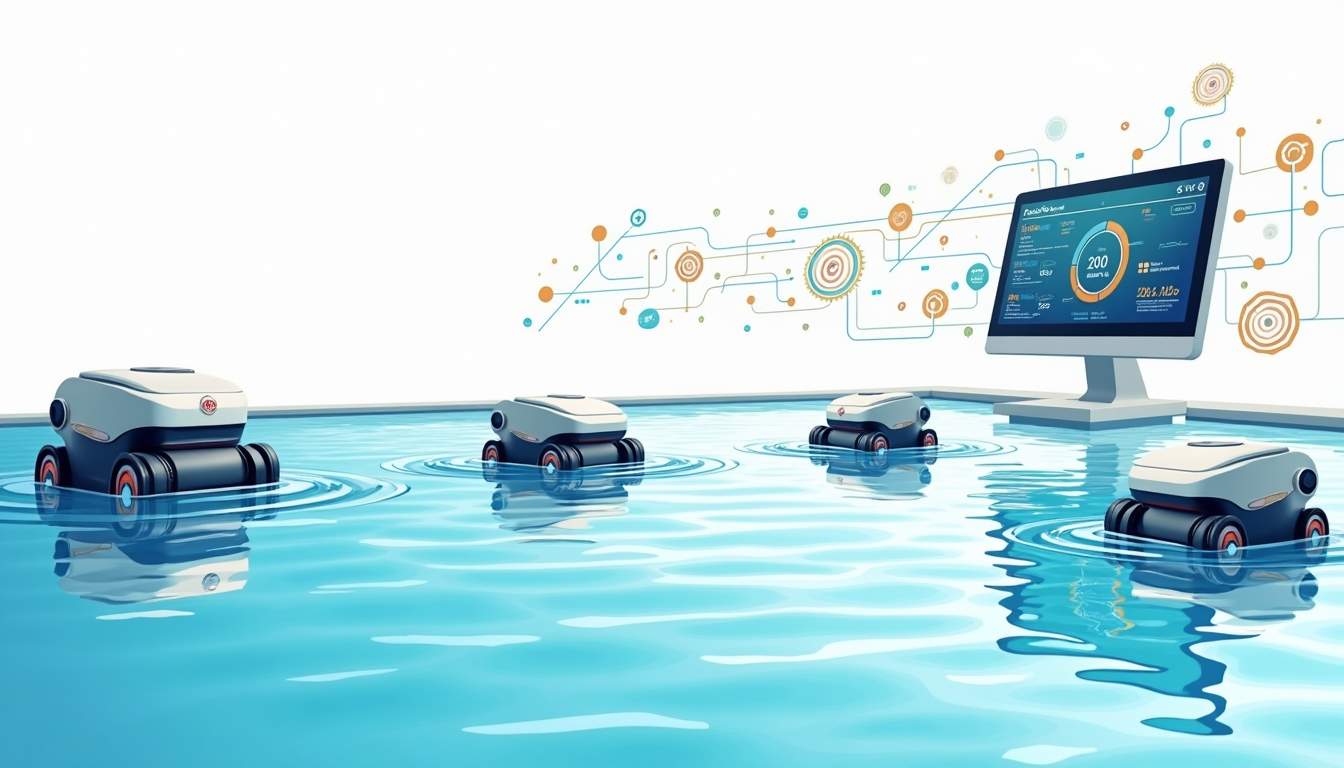In an age defined by rapid technological advancements, businesses constantly seek innovative solutions to enhance efficiency and productivity. The synergy between artificial intelligence (AI) and business process automation has emerged as a transformative force, paving the way for organizations to optimize their operations. This article delves into how AI changes the landscape of business processes, maximizes productivity, and shapes the future of work.
Understanding the Basics of AI and Business Process Automation
To appreciate the impact of AI on business process automation, it is crucial to first understand what these concepts entail. AI refers to the simulation of human intelligence processes by machines, particularly computer systems. It encompasses learning, reasoning, and self-correction, enabling systems to perform tasks typically requiring human intellect.
On the other hand, business process automation (BPA) is the technique of using technology to automate complex business processes. BPA focuses on streamlining operations, increasing service quality, and improving service delivery. When combined, AI and BPA create a powerful partnership that can revolutionize how businesses operate.
Defining AI in the Context of Business
In the context of business, AI can be seen as the application of sophisticated algorithms and data analytics to enable organizations to make informed decisions. It empowers businesses to predict trends, analyze customer behavior, and enhance operational effectiveness. AI-driven insights can lead to improved decision-making, reduced errors, and increased agility within business processes.
Moreover, AI can facilitate personalized customer experiences by analyzing vast amounts of data to tailor services and products to individual preferences. For instance, recommendation engines used by e-commerce platforms leverage AI to suggest items based on previous purchases and browsing history, thereby enhancing customer satisfaction and loyalty. As AI continues to evolve, its ability to process natural language and engage in conversation through chatbots is transforming customer service, allowing businesses to provide immediate support while reducing operational costs.
The Concept of Business Process Automation
Business process automation focuses on employing technologies to perform repetitive tasks without human intervention. By eliminating manual workloads, organizations can not only save time but also reallocate resources toward more strategic initiatives. Automation can range from simple tasks, such as data entry, to complex workflows requiring multiple systems and teams.
Furthermore, the integration of AI into BPA can lead to intelligent automation, where systems not only execute predefined tasks but also learn from the data they process. This capability allows businesses to continuously improve their processes by identifying bottlenecks and optimizing workflows. For example, in supply chain management, AI-driven automation can predict inventory shortages and automatically reorder stock, ensuring that businesses maintain optimal inventory levels without manual oversight. This not only enhances efficiency but also minimizes the risk of human error, ultimately leading to a more resilient and responsive organization.
The Intersection of AI and Business Process Automation
The intersection of AI and business process automation offers exciting possibilities for organizations. AI technologies, such as machine learning and natural language processing, can enhance traditional automation tools, making processes smarter and more efficient. This intersection creates a dynamic where machines learn from past data and adjust their behavior accordingly, leading to continuous improvement. As organizations increasingly adopt these technologies, they are not only optimizing their workflows but also redefining the very nature of work itself, allowing human employees to focus on more strategic tasks that require creativity and critical thinking.

How AI Enhances Business Process Automation
AI enhances business process automation by integrating intelligence into processes that were traditionally automated through rules-based systems. For example, AI can analyze large datasets to identify inefficiencies, leading to better-informed automation decisions. In customer service, AI-driven chatbots can handle inquiries more effectively by learning from previous interactions, significantly enhancing the customer experience. Moreover, these chatbots can operate 24/7, providing immediate responses to customer queries, which not only improves satisfaction but also reduces operational costs associated with human agents. The ability of AI to process language and sentiment also allows businesses to tailor their responses based on customer emotions, creating a more personalized interaction.
The Role of AI in Streamlining Business Processes
AI effectively streamlines business processes by facilitating real-time decision-making and reducing bottlenecks. Predictive analytics can foresee potential issues, allowing businesses to proactively address them. This not only increases operational efficiency but also fosters a culture of agility, where teams can quickly adapt to changes in the market or operational environment. For instance, in supply chain management, AI can predict demand fluctuations, enabling companies to adjust their inventory levels accordingly. This level of foresight minimizes waste and ensures that resources are allocated efficiently, ultimately leading to cost savings and improved service delivery. Additionally, AI's ability to analyze trends and patterns can help organizations identify new market opportunities, enabling them to innovate and stay ahead of the competition.
Impact of AI on Business Efficiency
The integration of AI into business processes drastically impacts overall efficiency. By automating routine tasks and providing actionable insights, organizations can achieve higher levels of productivity and effectiveness. This transformative approach has been instrumental for companies looking to stay competitive in fast-paced markets. Furthermore, the ability of AI to analyze vast amounts of data in real-time allows businesses to make informed decisions swiftly, adapting to market changes and consumer demands more effectively than ever before. As a result, businesses leveraging AI technologies are not just improving their operational capabilities but are also enhancing their strategic positioning in the marketplace.

AI and Time Management in Business
Time management is a crucial factor in business success. AI tools optimize scheduling, allocate resources, and prioritize tasks, ensuring that teams focus on high-value activities. For instance, AI-powered calendar systems can analyze past meeting efficiencies, suggesting optimal times for future appointments. This results in better alignment of team efforts and maximized productivity. Additionally, AI can facilitate better communication within teams by providing reminders and updates on project timelines, thus reducing the likelihood of missed deadlines and fostering a culture of accountability. The integration of AI in time management not only streamlines operations but also empowers employees to take ownership of their tasks, leading to increased job satisfaction and performance.
AI in Reducing Operational Costs
Another significant impact of AI in business is its ability to reduce operational costs. By automating mundane tasks, companies can significantly lower labor costs while also minimizing the chances of human error. Additionally, AI systems can identify areas where cost-cutting measures can be implemented without sacrificing quality, ultimately leading to higher profitability. For example, predictive maintenance powered by AI can foresee equipment failures before they occur, allowing businesses to perform maintenance only when necessary, thus avoiding costly downtime. Moreover, AI-driven analytics can help companies optimize their supply chains by predicting demand trends, enabling them to manage inventory more effectively and reduce waste. This multifaceted approach to cost reduction not only enhances the bottom line but also contributes to more sustainable business practices in the long run.
AI and Productivity in Business
The relationship between AI and productivity is increasingly critical in today’s business landscape. AI-driven tools not only streamline processes but also enhance overall output, enabling businesses to achieve their goals more effectively. Organizations that leverage AI for productivity stand to gain a competitive edge over their peers.
AI in Boosting Employee Productivity
AI helps boost employee productivity by automating repetitive tasks, allowing employees to focus on higher-order functions that require critical thinking and creativity. By reducing the burden of monotonous tasks, employees can engage more deeply with their work, leading to greater job satisfaction and improved outcomes. Training programs that incorporate AI-driven insights can further develop employees' skills, aligning their efforts with strategic business goals.
AI and Business Output
The potential of AI to enhance business output is immense. By analyzing market trends, customer preferences, and operational efficiencies, organizations can make data-driven decisions that lead to increased sales and higher-quality products. This strategic approach ensures that businesses not only meet but exceed customer expectations, driving growth and retention.
Future Prospects of AI in Business Process Automation
The future of AI in business process automation looks promising. As technology continues to evolve, organizations must stay informed about emerging trends to remain competitive. The possibilities presented by AI could redefine traditional business models, leading to innovations and increased efficiency.

Predicted Trends in AI and Business Automation
Some anticipated trends include the proliferation of AI-driven analytics, advancements in machine learning, and the rise of intelligent automation tools. Organizations are likely to adopt more sophisticated AI systems that not only automate but also anticipate needs, leading to proactive business strategies. The integration of AI with other emerging technologies like blockchain and the Internet of Things (IoT) is expected to create new avenues for operational efficiencies.
Preparing for an AI-Driven Business Future
To prepare for an AI-driven future, businesses must cultivate a culture that embraces technology and innovation. This involves investing in training and development to equip employees with the necessary skills to leverage AI effectively. Moreover, organizations should focus on building agile processes that can quickly adapt to changes driven by AI advancements. By remaining forward-thinking and adaptable, businesses can harness the full potential of AI in their operations.
In conclusion, AI in business process automation is more than just a trend; it represents a paradigm shift in how businesses operate. By understanding and embracing this technology, organizations can revolutionize their efficiency and productivity, setting a solid foundation for future success.
Ready to harness the power of AI in your pool service business and experience a revolution in efficiency and productivity? ProValet is here to elevate your operations to the next level. With our tailored automation solutions, you can optimize scheduling, dispatching, invoicing, and enhance customer communication, all while maintaining the unique character of your business. Embrace the future with ProValet's integrated Homeowner app and user-friendly tools that promise not just to serve but to adapt and grow with you. Take the first step towards transforming your business model and join the ranks of satisfied professionals who have seen over 70% of invoices paid within a week. Schedule your 15 minute Discussion & Demo today and let ProValet help you unlock the full potential of AI-driven business process automation.








